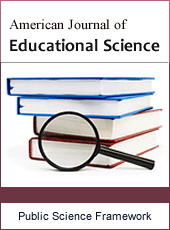American Journal of Educational Science
Articles Information
American Journal of Educational Science, Vol.4, No.4, Dec. 2018, Pub. Date: Aug. 31, 2018
Analysis on the Reform of Business Japanese Curriculum Based on JSP Theory
Pages: 86-92 Views: 2308 Downloads: 334
[01]
Wang Jiadong, Department of Foreign Language, Shandong Jiaotong University, Jinan, China.
As the economic exchanges between China and Japan are becoming more and more frequent and deepened,the market no longer favours graduates who have mastered Japanese language only. The demand for qualified talents who are proficient in Business Japanese knowledge is increasing. The concept of Business Japanese has also come into being. Up to now, there are still many colleges and universities which trade Business Japanese just as a practice course. In this course, students learn business knowledge after learning Japanese knowledge. The university in which the author works, is the member from the beginning of the establishment of China Association of International Trade-International Business Japanese Research Committee in 2007. After years of exploration and practice, a distinctive Business Japanese major has been formed in author’s university, not just a course. The market is always changing. The existing curriculum system and teaching methods can not be applied all the time. In the past, people always explored the improvement in the traditional Japanese teaching method. The introduction of JSP theory (Japanese for Specific Purposes) can help us to solve this problem from a more professional perspective. JSP theory originated in the 80s of last century, and its development is short. It has been introduced into China for a short time, and has not even been popularized in the field of Japanese education in China. At present, the study of JSP theory in Japanese education is mostly about the analysis of professional terms and discourses, or the discussion of teaching materials and teaching methods from the perspective of learners and instructors. There are relatively few papers on JSP courses from the perspective of social needs. After entering the twenty-first Century, education of Japanese major in Colleges and universities is facing unprecedented competition pressure and survival pressure. How to cultivate Japanese talents who meet the needs of the society and how to improve the advantages of graduates become important issues that must be considered. The author is to use JSP theory to guide the reform of business Japanese curriculum system and teaching methods, and then achieve the goal of training business Japanese talents that meet the needs of society.
JSP, Business Japanese, Teaching Practice, Business Writing
[01]
Shu Ding fang (2004), The problems and Countermeasures of foreign language teaching reform, Shanghai Foreign Language Education Press.
[02]
Sano Hiromi (2009), Japanese education based on special purpose, Study of special Japanese Education
[03]
Zhang Suwen (2011), A probe into the instruction of ESP theory to the teaching of specific Japanese, Journal of Mudanjiang Normal University.
[04]
Liu Wei (2013), The development and Enlightenment of Japanese Education Research, Japanese learning and research.
[05]
Zhou Yan (2016), Study on the cultivation of pragmatic competence in the teaching of Business Japanese, The Science Education Article Collects.
[06]
Qu Di (2016), Analysis of the course setting of Business Japanese, Guide to Business.
[07]
Jiang Wei (2017), Research on the teaching model of basic Business Japanese course, Journal of Japanese Language Study and Research.
[08]
Ma Bo (2017), The penetration and integration of Japanese corporate culture in Business Japanese Teaching, Japanese education and Japanese Studies.
[09]
Guo Siyan (2017), Business Japanese and Japanese corporate culture, Journal of Jiamusi Vocational Institute.
[10]
Wang Yanhong (2018), The reform of Business Japanese Teaching under the model of school corporate cooperation, Journal of Shaoguan University.
[11]
Tong Ling (2018), Research on the development and present situation of Japanese Business Japanese Education, Journal of Japanese Language Study and Research.

ISSN Print: 2381-7127
ISSN Online: 2381-7135
Current Issue:
Vol. 6, Issue 2, June Submit a Manuscript Join Editorial Board Join Reviewer Team
ISSN Online: 2381-7135
Current Issue:
Vol. 6, Issue 2, June Submit a Manuscript Join Editorial Board Join Reviewer Team
| About This Journal |
| All Issues |
| Open Access |
| Indexing |
| Payment Information |
| Author Guidelines |
| Review Process |
| Publication Ethics |
| Editorial Board |
| Peer Reviewers |


